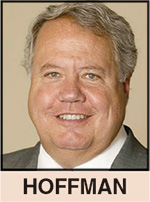By CARL GREEN
Illinois Correspondent
Springfield, IL – A bill designed to overcome some of the damage caused by the 2018 Janus decision in the Supreme Court has passed the Illinois Legislature and awaits the governor’s promised signature.
Rep. Jay Hoffman (D-Swansea) sponsored the bill in the House, which passed it 93-23 in October and sent it to the Senate, where it passed on a 45-9 vote on Nov. 13 with wide bipartisan support, although the few opponents were Republicans and some didn’t vote.
Meanwhile, the face and name of the Supreme Court decision, former Illinois state employee Mark Janus, lost his appeal of a federal ruling denying him retroactive reimbursement of fair share fees he had paid to AFSCME.
Hoffman’s bill, written in conjunction with AFSCME and other unions, includes measures that protect the union’s ability to communicate with workers, who now must decide whether to pay fees to the unions that negotiate their salaries and benefits. The bill would protect workers’ privacy by making employees’ personnel information exempt from the Freedom of Information Act.
 “Organized Labor is the backbone of the middle class and has deep roots in the Midwest, especially here in the Metro East,” Hoffman said. “While the Rauner administration’s union-busting tactics took advantage of the recent Janus decision to exploit workers, Illinois can be a leader in standing up for working families by protecting employee privacy.”
“Organized Labor is the backbone of the middle class and has deep roots in the Midwest, especially here in the Metro East,” Hoffman said. “While the Rauner administration’s union-busting tactics took advantage of the recent Janus decision to exploit workers, Illinois can be a leader in standing up for working families by protecting employee privacy.”
Unions that endorsed the legislation included the AFL-CIO and AFSCME plus the Service Employees (SEIU), the Illinois Federation of Teachers and the Illinois Education Association, Laborers, Nurses and locals from UFCW and IBEW.
WHAT IT DOES
The legislation makes changes to the Illinois Public Labor Relations Act and the Illinois Educational Labor Relations Act. Among the changes, the legislation:
- Requires employers to provide names and addresses of public employees in each bargaining unit at least once a month.
- Prohibits employers from trying to discourage employees from becoming union members or authorizing dues deductions.
- Requires employers to refer inquiries about union membership to the appropriate bargaining representatives.
- Prohibits employers from disclosing personal employee information to anyone other than bargaining representatives.
- Gives union representatives the right to meet with new employees on the employer’s time.
A MAJOR VICTORY
Ed Caumiant, regional director for AFSCME, told the Southwestern Illinois Central Labor Council last week that passage of the bill is a major victory for Labor that doesn’t reverse Janus but does mitigate its effects.
“What we’re doing here is both answering the loss in Janus and the fair share provision there, but also doing as much we can to protect Labor from the next assaults.”
 A key element is that the unions, and not the employers, will determine when dues should be deducted from new or returning members.
A key element is that the unions, and not the employers, will determine when dues should be deducted from new or returning members.
“Whenever we tell them we’re satisfied that somebody has signed up, they have to do it,” Caumiant said.
Under Rauner, the state often stalled before beginning deductions. “Rauner would play around for months and months on end,” Caumiant said. “Now, whenever we’re satisfied that somebody has signed up, they have to make the deductions.”
THE TIGHT WINDOW
The new law still allows members to drop out of their unions, but only within specified annual periods, typically 30 days, in an effort to counter corporate campaigns aimed at convincing members to quit their unions.
“It’s a very tight window,” Caumiant said. “It’s designed basically to keep our opponents from banging away at our members and getting them to drop out of the union so we have to go chase them and get them back.”
Now it’s up to the employers to get the payments started within 30 days. “If they don’t, we don’t go after the member, we go after the employer,” he added.
Similarly, record-keeping about who counts as union members is not left up to employers but will be handled by the unions. At one point under Rauner, Caumiant said, 7,800 legitimate dues cards disappeared one day.
“They just stopped deducting on 7,800 members,” he said. “This law turns that on its head. We are now the keeper of the record. It’s a very big victory.”
The guaranteed orientation time for unions will help ward off corporate door-knocking campaigns to convince members to quit their unions, as have already been seen on the east and west coasts.
“We believe this will give us a leg up,” Caumiant said.
BATTLES TO COME
Hoffman pledged to continue working to support working families and building a stronger middle class.
“Unfortunately, certain public institutions have no regard of what is in the best interest of the workers they employ,” he said.
Caumiant said recent Labor victories in Illinois will need to be protected and followed up.
“It’s nice to have some victories; it’s been a good year for Labor,” he said. “But we need to keep that up, and we need to hit the ground harder than we’ve ever hit it in 2020 for two things – the Fair Tax and to beat Trump.
“I’m here to get everybody excited. This is our time; this is our opportunity.”
For more information about the legislation, contact Hoffman’s office at 618-416-7407 or send email to repjayhoffman@gmail.com.
Court: No refund for Mark Janus
Chicago – Well, at least Mark Janus won’t get his refund.
The man whose name was used to file a court case aimed at destroying public employee unions is not entitled to retroactive reimbursement for union fees collected in good faith by AFSCME, a three-judge panel of the Illinois 7th Circuit Court of Appeals has ruled.
Janus was the plaintiff in the infamous 2018 court case in which the corporate-packed U.S. Supreme Court ruled that public employees do not have to pay negotiating fees to the unions that win contracts for them. He had worked as a state child-support specialist but now is with the anti-union Liberty Justice Center.
Union enemies had hoped the ruling would spur millions of members to abandon their unions while still collecting salaries and benefits the unions had negotiated.
Instead, the vast majority of union members have resisted the temptation to freeload and continued as honorable, dues-paying members.
20 OTHER CASES
Following the Supreme Court ruling, Janus filed suit in federal court to be reimbursed for his past fair share payments to the union. As in about 20 other cases that have been presented, the court ruled against him.
“The court noted that Janus did not propose to give back the benefits that AFSCME had won for him,” the union reported. “AFSCME members have responded to the Supreme Court’s 2018 Janus decision with resilience and courage. In every arena, our union continues to fight and win for working people – in the organizing trenches, at the bargaining table, at the ballot box and in the courts.”
Union foes still hope one of the cases will make its way to the Supreme Court, where a decision in Janus’ favor could be devastating to the unions.

